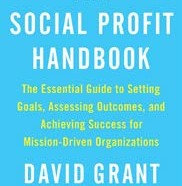
The Social Profit Handbook: The Essential Guide to Setting Goals, Assessing Outcomes, and Achieving Success for Mission-Driven Organizations
by David Grant, former faculty
Chelsea Green Publishing, Spring 2015
People working in non-profit organizations can and will lead us out of our world’s “mess,” David Grant believes, but to achieve that, they have to change the way they think about assessment — measuring their success. To begin with, David argues for a shift in vocabulary. We are familiar with organizations that create or preserve financial profit; the groups that give us access to medical care, art and music, clean rivers, high-functioning public transportation or that empower young people should be called social profit organizations. Social profit organizations have to define the outcomes that people they seek to help actually need and value. To create and capture social profit, David argues, you need both quantitative and qualitative measures, both numbers and assessment of things that can’t be expressed in numbers. In his newly published handbook, David “shows how to measure success in a way that helps you achieve it, illustrated by examples of organizations that have done exactly that.” Those who lead, govern and support non-profit organizations can learn about formative assessment in The Social Profit Handbook — assessment practices that will improve future work rather than merely judge past performance.
David Grant, former Milton English department faculty member, and his wife, Nancy Grant, a co-founder of Milton’s Mountain School Program, have developed this handbook for mission-driven organizations. David’s career has centered on innovative teaching and learning; he served as president and CEO of the Geraldine R. Dodge Foundation in Morristown, New Jersey. He now consults with organizations around the world that have a social or educational mission.



